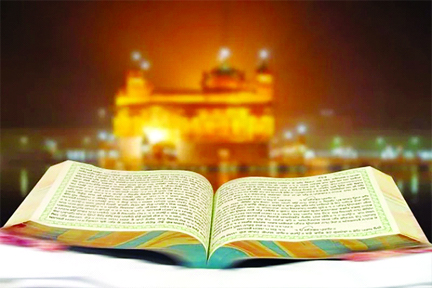
Prakash Utsav of Sri Guru Granth Sahib Ji takes place on the 15th day (New Moon) of Bhadon, the sixth month of the Punjabi calendar, which occurs in August or September in the Western calendar.
Guru Granth Sahib Ji is unique among the great texts of the world. It is considered to be the supreme spiritual
authority and head of Sikhism rather than any living person. It is also the only book of its kind that not only contains the works of its religious founders but also the writings of people of their faith. The living Guru of the Sikhs, the book is kept with great reverence by the Sikhs and is treated with the utmost respect. The Guru Granth Sahibji is a compilation of many hymns, poems, Shabad and other writings from several different scholars, including the Sikh Gurus and other saints.
Guru Granth Sahib jihas 1,430 pages, and each copy is identical.It contains words spoken by the Gurus. It is known as Gurbani, which means ‘from the mouth of the Guru’.It is considered the word of God. It is written in Gurmukhi.
History of Guru Granth Sahib ji
Guru Arjan Dev ji, the fifth Sikh Guru compiled the original version of Guru Granth Sahib ji. Guru Arjan Dev ji felt that the Sikhs needed authentic compilation of the hymns of their gurus. Thus Guru ArjanDev ji started the collection of original verses of all the Gurus. He sent reliable Sikhs like Bhai Piara ji, Bhai Gurdas ji and Baba Buddha ji across the country in search of original manuscripts. Guru Arjan Dev ji travelled to Goindwal, Khadur and Kartarpur to visit the families of the previous Gurus. Guru Arjan Dev ji collected original manuscripts of the Gurus from Mohan ji (son of Guru Amar Das ji), Datu ji (son of Guru Angad ji) as well as Sri Chand ji (son of Guru Nanak ji).
Compilation and Contents of the Guru Granth Sahib
Many of Guru Nanak ji’s hymns and prayers were preserved and complied by Guru Angad ji and Guru ArjanDev refuse to expunge the so-called offensive text or pay the fine. Guru Arjan Dev ji was against making alterations in the hymns as required by Jahangir and instead preferred a martyr’s death. This led to his execution. The Adi Granth was completed in 1604 and installed in the Golden Temple. In 1708, Adi Granth became Sri Guru Granth Sahib Ji, the Eternal Guru of Sikhs as was declared by Guru Gobind Singh Ji. After Guru Gobind Singh ji’s martyrdom in 1708, Baba Deep Singh ji and Bhai Mani Singh ji prepared many copies of the Sri Guru Granth Sahib ji for distribution. The original version of the Sri Guru Granth Sahib can be found at Nanded, a city in Maharashtra state.
Sri Guru Granth Sahib ji which presides over in other gurdwaras are copies of this edition.The first Shabad of the Guru Granth Sahib ji is the “Mool Mantra”. This is a statement of recognition for Sikhism. This underlines the belief in one God.The first line of the Sri Guru Granth Sahib ji is “Ik Onkar”. It literally means ‘there is only one God’.
Guru Gobind Singh Ji raised Sri Guru Granth Sahib ji to the status of a permanent Guru and conferred it the title of “Guru of the Sikhs” in 1708. Declaring the Sri Guru Granth Sahib ji to be the next Guru after him, Guru Gobind Singh ji commanded the Sikhs to regard the Guru Granth Sahib ji as their next and everlasting Guru.
He said, “Sab Sikhan ko hukamhai Guru Manyo Granth” meaning thereby that all Sikhs are commanded to regard the Granth as a Guru.
Guru Gobind Singh ji commanded the Sikhs in the following words
– Agya Bhai Akal Ki Tabhi Chalayo Panth. (Under orders of the Immortal Being, the Panth was created)
– Sabh Sikhan Ko Hukam Hai Guru Manyo Granth. (All the Sikhs are enjoined to accept the Granth as their Guru)
– Guru Granth Ji Manyo Pargat Guran Ki Deh. (Consider the Guru Granth as embodiment of the Gurus)
– Jo Prabhu Ko Milbo Chahe Khoj Shabad Mein Le. (Those who want to meet God, can find Him in its hymns)
– Raj Karega Khalsa Aqi Rahei Na Koe, (The pure shall rule, and impure will be no more)
– Khwar Hoe Sabh Milange Bache Sharan Jo Hoe. (Those separated will unite and all the devotees shall be saved)
Facts about Sri Guru Granth Sahib ji
– Total words – 398697
– Most often repeated word is “Hari” – 9288 times
– No punctuation marks have been used
Authors /contributors:
– Six Sikh Gurus, first Five Gurus (Guru Nanak dev Ji, Guru Angad dev Ji, Guru Amar Das ji, Guru Ram Das ji,Guru Arjan Dev ji) and ninth Guru (Guru Tegh Bhadur Ji)
– Sri Guru Granth Sahib jiincludes sermons of Guru Nanak Dev Ji (974 Shabad and Shloka), Guru Angad Dev Ji (62 Shloka), Guru Amardas Ji (907 Shabad and Shloka), Guru Ram Das Ji (679 Shabad and Shloka), Guru Arjan Dev Ji (2218 Shabad and Shloka) and Guru Tegh Bahadur Ji (115 Shabad and Shloka).
– Three Sikhs (Bhai Satta ji, Bhai Balwand ji and Bhai Sundar ji)
– 17 Bhatts: The Bhatts were a group of musicians who lived in the sixteenth century. All of them were scholars, poets and singers. (Bhat Kal, Bhat Kalsehar, Bhat Tal, Bhat Jalup, Bhat Jal, Bhat Kirat, Bhat Sal, Bhat Bahil, Bhat Nal, Bhat Bhikha, Bhat Jalan, Bhat Kas, Bhat Gend, Bhat Sevak, Bhat Mathra, Bhat Bal andBhat Harbans)
– 15 Bhagats (Kabir, Namdev, Ravidas, Sheikh Farid, Trilochan, Dhanna, Beni,Sheikh Bhikan, Jaidev, Surdas, Parmanand, Pipa, Ramanand, Sadhna and Sain)
Prayers
Nitnem
It is the collection of hymns of different Gurus to be read daily by the common people at least three times a day. Nitnem usually includes Panj Bania and sometimes includes Rehiras Sahib and Kirtan Sohilla ( for the night). The morning and the evening prayers should be followed by a set of prayers known as Ardas. The five Banis or the Panj Bania are Japji Sahib- appears at the beginning of the Guru Granth Sahib
Jaap Sahib
Morning prayers of the Sikh which was composed by tenth Guru Gobind Singh and is found at the start of Sikh scripture Dasam Granth. It is the praise of God and includes names of various Gods in different languages. It is composed of 199 verses and is the first Bani of Dasam Granth.
Tav- Prasad Savaiye
It is a short composition that contains around 10 stanzas and is present on pages 13 to 15 of Dasam Granth.
Chaupai Sahib
Also referred as Banti Chaupai is a hymn by Guru Gobind Singh
Anand Sahib
It is the collection of hymns written by Guru Amar das Ji who was the third Guru in Sikhism. It is available from page 917-922 in Guru Granth Sahib. It is chanted at all the religious ceremonies of the Sikhs
Rehras Sahib
It is the evening prayer of Sikhs which is a part of Gurbani ( Hymns in the central text of Guru Granth Sahib). It contains hymns of four different Gurus Guru Nanak, Guru Amardas, Guru Ramdas, Guru Arjan Dev, and Guru Gobind Singh Ji. It gives energy to the mind and body after the day-long hard work. It is in a way to thank God for completing the day with no hassles. Rehras contains hymns from So Dar and So Purakh, Chaupai Sahib, Anand Sahib, and Mundhavani. Chaupal Sahib is taken from Dasam Granth.
Kirtan Sohila
It is the night prayers chanted by all Sikhs before they go to bed. It is composed of five hymns or Shabd. The five hymns are contributed by Guru Nanak, Guru Ram das, and Guru Arjan. The first three hymns were uttered by Guru Nanak, the fourth by Guru Ram Das, and the fifth by Guru Arjan Dev.





Be the first to comment